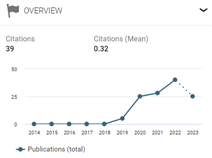"AKSI GERCEPS" training program to support nutritional knowledge of adolescent integrated health centre cadres in Sampang Regency
DOI: 10.30867/gikes.v5i3A.1732Abstract
Background: After the covid-19 pandemic, adolescent Integrated Health Centre (IHC) activities in Sampang Regency decreased drastically, both in quantity and quality. Factors related to this problem are the lack of adolescent participation, accompanied by the lack of ability of adolescent IHC cadres to perform their duties. Adolescent IHC is preventive efforts to prevent incidents of stunting.
Objective: The study aimed to measure the effect of "AKSI GERCEPS" training on nutrition knowledge among adolescent IHC cadres in Sampang Regency.
Methods: : Study quasi-experimental use one-group pretest-posttest design. The research was conducted in Sampang Regency in December 2023. The sample consisted of 72 people, selected using a purposive sampling method representing 12 locus villages stunting. The research variable is the effect of "AKSI GERCEPS" training on increasing the nutritional knowledge of adolescent IHC cadres. Data analysis used the T-test.
Results: Mean scores before and after training were significantly different (p=0,000). At the end of the training, the participants' average score increased to 6,58, whereas before the training was 2,55. The knowledge of adolescent cadres who had previously received nutrition education was also significantly different from that of those who had never received nutrition education (p=0,000). After the training, cadres who had received nutrition education had an average score of 1,78 higher.
Conclusion: Cadres knowledge of nutrition increased after the training. Nutrition training for adolescents needs to be carried out continuously, to be able to provide optimal service.
Keywords
Full Text:
PDFReferences
Arini, M., Ranti, I., & Primastuti, H. I. (2023). Revitalisasi posyandu remaja untuk membangun generasi sehat di padukuhan puluhan lor, trimurti, srandakan, bantul. Martabe: Jurnal Pengabdian Kepada Masyarakat, 6(1), 12–27. https:// 10.31604/jpm.v6i1.12-27
Dinihari, Y., A’ini, Z. F., & Solihatun, S. (2019). Pemberdayaan kader posyandu melalui penerapan metode konseling gizi dan komunikasi efektif pada kader posyandu kelurahan pademangan barat jakarta utara. Adimas: Jurnal Pengabdian Kepada Masyarakat, 3(1), 39–45. http://dx.doi.org/10.24269/adi.v3i1.902
UNICEF (2017). End hunger, achieve food security and improved nutrition and promote sustainable agriculture. https://doi.org/10.18356/0c50953a-en
Ertiana, D., Septyvia, A. I., Utami, A. U. N., Ernawati, E., & Yualiarti, Y. (2021). Program peningkatan kesehatan remaja melalui posyandu remaja. journal of community engagement and empowerment, 3(1). https://doi.org/10.35568/abdimas.v3i2.579
Fadjri, T. K., & Jamni, T. (2020). Pemberdayaan kader posyandu melalui penerapan metode konseling gizi dan komunikasi efektif. Jurnal SAGO Gizi Dan Kesehatan, 2(1), 103–107. http://dx.doi.org/10.24269/adi.v3i1.902
Fatmah, F. (2020). Training program to support posbindu cadre knowledge and community health centre staff in the Geriatric Nutrition Service. ASEAN Journal of Community Engagement, 4(2), 500–518. http://dx.doi.org/10.7454/ajce.v4i2.1051
Fauziah, N., Andayani, Q., Ariadi, S., Koesbardiati, T., & Praharsena, B. (2022). Penta-helix “desa emas” as a commitment to accelerate stunting reduction in sumenep regency, east java province. Media Gizi Indonesia, 17(1SP), 64–75. https://doi.org/10.20473/mgi.v17i1sp.64-75
Hutmacher, F. (2019). Why is there so much more research on vision than on any other sensory modality?. Frontiers in Psychology, 10, 2246. https://doi.org/10.3389/fpsyg.2019.02246
Ministry of Health (2022). Profil Kesehatan Indonesia 2021, Pusdatin. Kemenkes. Go. Id.
Kumalasari, E. P., & Nursanti, D. P. (2022). The influence of the role of midwives on youth activeness in participating in youth posyandu. Journal for Quality in Women’s Health, 5(2), 181–188. https://doi.org/10.30994/jqwh.v5i2.161
Kusumawardani, H., Rakhma, L. R., Laili, N. A., Putri, A. M., Anggraini, D., Rosida, S. M., Mastura, K., Fadilla, R. R., & Salsabila, C. A. A. (2022). Peningkatan pengetahuan remaja mengenai pemenuhan gizi seimbang melalui isi piringku di man 1 surakarta. Jurnal Abdi Insani, 9(3), 1200–1208. https://doi.org/10.29303/abdiinsani.v9i3.700
Lavin, D. (2013). Must there be basic action? Noûs, 47(2), 273–301. https://doi.org/10.1111/j.1468-0068.2012.00876.x
Munira, S. L. (2023). Hasil survei status gizi indonesia (ssgi) 2022. Jakarta: Badan Kebijakan Pembangunan Kesehatan Kementrian Kesehatan RI.
Nurasiah, A. (2020). Pelatihan dan pendampingan kader sebagai upaya optimalisasi posyandu remaja di desa bayuning kecamatan kadugede kabupaten kuningan. IAKMI Jurnal Kesehatan Masyarakat Indonesia, 1(2), 75–80. https://doi.org/10.46366/ijkmi.1.2.75-80
World Health Organization. (2014). Global nutrition targets 2025: Stunting policy brief. World Health Organization.
Podungge, Y., Nurlaily, S., & Mile, S. Y. (2022). Pemberdayaan kader dalam upaya peningkatan pengetahuan dan sikap remaja putri tentang anemia. Jurnal Surya Masyarakat, 4(2), 199–207. https://doi.org/10.26714/jsm.4.2.2022.199-207
Satriawan, E. (2018). Strategi nasional percepatan pencegahan stunting 2018-2024. Jakata: Tim Nasional Percepatan Penanggulangan Kemiskinan (TNP2K).
UNICEF. (2021). Social and Behaviour Change Communication Strategy: Improving Adolescent Nutrition in Indonesia. UNICEF Indonesia: Jakarta.
Refbacks
- There are currently no refbacks.














